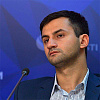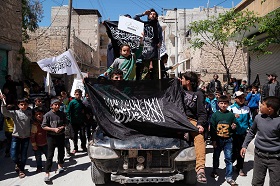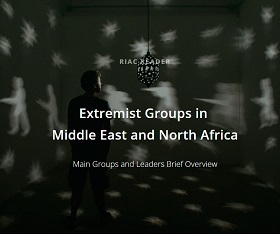En Route to Useful Syria: Al-Qaeda Back in the Game?
Members of al Qaeda's Nusra Front,
May 28, 2015
(no votes) |
(0 votes) |
Ph.D. in History, Scientific Advisor of The Evgeny Primakov Center for International Cooperation, Senior Research Fellow, Center for the Arab and Islamic Studies, Institute of Oriental Studies RAS
Because the initial strikes by the Russian Air Force were not targeted only against ISIS, it became clear that the operation has also been meant to support the Syrian Arab Army of President Bashar Assad and stabilize the frontline. Meanwhile, restoring Damascus’s control over the whole of Syrian territory seems unlikely.
Because the initial strikes by the Russian Air Force were not targeted only against ISIS, it became clear that the operation has also been meant to support the Syrian Arab Army of President Bashar Assad and stabilize the frontline. Meanwhile, restoring Damascus’s control over the whole of Syrian territory seems unlikely.
Russian military involvement in the Syrian conflict has sparked the ire of regional actors, primarily Saudi Arabia and Turkey who have seen their interests infringed upon. However, the Saudis continue to arm the Syrian antigovernment forces trying to topple the regime and Turkey's Prime Minister Ahmet Davutoglu is using the UNGA platform to demand the establishment of a security zone in northern Syria close to the Turkish border for settling the refugee problem. Meanwhile, Russia continues to attack various groups on the territory titled Useful Syria by Arab analysts. This land stretches from Damascus to the cities of Kalamun, Homs, Darya, Hama and Aleppo, including Latakia and Tartus on the Mediterranean coast (1, 2). The cleaning up of these areas and stabilization of the frontline against the Islamic State may be the real goals of the coalition which includes Russia, Iran, Iraq, Mr. Assad's Syria and the allied Lebanese Hezbollah with the 4+1 Information and Coordination Center in Baghdad. Iraq also welcomes Russian air attacks against the ISIS on its territory, which has been confirmed both by Prime Minister Haider al-Abadi and Ayatollah Ali al-Sistani, the most influential Shiite figure. However, the level of Russia-Iraq cooperation still depends on Washington's stance.
The weakening of Jabhat al-Nusra and its allies caused by Mr. Assad's army and Russian air support has markedly strengthened ISIS in northern Syria.
Many analysts agree that Moscow is siding with the Shiite Crescent, although Russia's stance is quite clear. President Vladimir Putin repeatedly described it as providing support to Syrian institutions in areas where they still exist in order to stop the disintegration of Syrian society. Those who made the decision on bombing could not neglect the response of a certain segment of the Arab world. Several days after the launch of Russian air raids, 52 Saudi clergymen, among them members of the International Union of Muslim Scholars, signed an appeal to counter Russian forces in Syria. Several armed Islamist groups outside of ISIS called upon their kin to join efforts and cooperate with the Arab states. On October 13, Jabhat al-Nusra, whose positions have suffered from Russian attacks, jumped in to oppose "the New Crusade" [1]. In alliance with other groups in the Syrian theater (the largest of them being Ahrar al-Sham or the Islamic Movement of Free Men of the Lavant), al-Nusra has formed Jaish al-Fatah or the Army of Conquest. In 2015, the coalition delivered several painful blows to Mr. Assad's forces, capturing Idlib, a large city, and the Abu al-Duhur airbase that fell on September 9 after two-year long resistance. The Islamists also ousted government forces from Jisr ash-Shugur region, opening the way to Latakia, the Alawite stronghold. In fact, the Syrian army is mostly fighting these forces rather than ISIS.
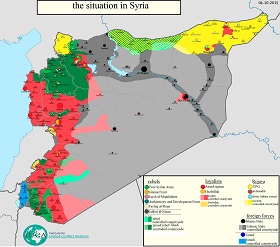
The Situation in Syria
The opposition and Jabhat al-Nusra are fighting ISIS, with the intensity abating for a short time when ISIS warred against the Kurds in northern Syria. However, Jabhat al-Nusra and its allies were weakened by the government forces’ offensive supported by Russian air strikes targeted with the help of Syrian intelligence, and ISIS gained some ground in the north.
Jabhat al-Nusra: the Inception
Jabhat al-Nusra was originally connected to central al-Qaeda and emerged out of its Iraqi branch, the former al-Qaeda of Iraq in 2004, which in 2006 transformed into the Islamic State of Iraq (ISI).
By 2011, Syria became the main jihadist hub and the foundation for recruiting jihadists after the U.S. invasion in Iraq in 2003. During this period, the insurgents established routes for delivering human and material resources, contacts and ramified networks which could also be used for transferring combatants to Iraq. Syrian secret services must have been aware of these movements but seemed to believe that they were able to control these events [2]. The available infrastructure and amnesty of 2011, which gave freedom to several important Islamists, must have helped a lot when ISI sent its trained fighters headed by Abu Muhammad al-Jilani to Syria as the crisis broke out. Manned mostly by Syrians, the organization was named Jabhat al-Nusra li-Ahli ash-Sham (the Support Front for the People of ash-Sham). Its leader al-Jilani frustrated the plans of ISI chief Abu Bakr al-Baghdadi, who wanted to dissolve Jabhat al-Nusra and amalgamate it with ISI into the Islamic State of Iraq and Sham, pledging allegiance to Aiman al-Zawahiri who replaced Osama bin Laden as the top man of al-Qaeda. After futile attempts to reconcile al-Jilani and al-Baghdadi, al-Zawahiri proclaimed Jabhat an-Nusra as the official representative of al-Qaeda in the lands of Sham. Although many an-Nusra combatants moved into ISIS, which has driven the former from its territories, the new al-Qaeda branch in Syria found support among many veterans and key thinkers of global jihad [2]. Former members of the nonexistent ISI still loyal to al-Zawahiri also sided with the organization titled Jabhat al-Nusra Tanzim Kaidat al-Jihad fi Bilad al-Sham or the Qae'dat Al-Jihad organization in the Levant [3]. Al-Jilani openly stated that his group was opposing various forces. He refused the support of Arab states, Turkey and Western enemies for the sake of "crushing the Baath foe," the ruling party of Syria. His organization has taken over the anti-Iranian and anti-Shiite rhetoric of ISIS (unusual for al-Qaeda), which proclaims that Safaviya is the enemy penetrating Syria to restore the Persian Empire, hinting towards Iran of the Shiite Safavid dynasty [4].
Hence, at its inception Jabhat al-Nusra was attempting to combine a Sunni identity and sectarian intransigence (specific to ISIS) with a new approach of central al-Qaeda formed as a response to the Arab Spring, a duality that has several times generated a crisis in an-Nusra's ideology. Nevertheless, during the next stage, al-Jilani conciliated al-Zawahiri to establish the key strategic concepts of the organization.
Rebranding of al-Qaeda
Next, an-Nusra began acquiring an adapted ideology of central al-Qaeda that implied the idea of Ansar al-Sharia or supporters of Sharia, which meant support for popular protest movements.
While in the past al-Qaeda’s ideology rested on a dichotomy of the struggle against the near/far enemies of Islam and globalization of jihad, in the context of Arab uprisings, the leaders had to adjust their body of thought.
The proclamation of democratic ideas provided synthetic grounds for a modernized al-Qaeda, whereas the Arab revolutions were an escape from the worst enemy personified by the Arab regimes.
According to former chief ideologue and current organization leader al-Zawahiri, Arab uprisings perfectly fit into the struggle for liberation from tyrannical regimes and occupational forces, which had been launched by al-Qaeda in Afghanistan and Iraq. In the Arab world, legitimate and free rule means the freedom to choose Sharia and establish an Islamic state to oppose Israel and thwart its plans. The messages of al-Zawahiri imply an appeal to Muslims in all countries of the world to establish Sharia rather than democratic rule, with the focus placed on the differences between Western democracy and Islamic Shura or council.
The Arab Spring provided al-Qaeda with new openings because an emerging democracy is known to assist various political forces that can offer unambiguous slogans. At the same time, the organization deems it necessary to influence these forces for establishing Sharia as the key regulator of social life. Theoretically, it is society or rather then the supporters of Sharia who must drive this process, which constitutes a major concept of Salafi-style jihadism. Although the matter has been elaborated by such eminent Salafi thinkers as Abu Yahya al-Libi, Anwar al-Awlaki and others, the honor of propagating the idea in masses belongs to Mauritanian preacher Abu al-Mundhir al-Shanqiti who aimed to bring the undercover work into public activities and thus replace spontaneous protests with organized actions in favor of Sharia rule.
At its inception, Jabhat al-Nusra tried to combine a Sunni identity with sectarian intolerance and a new political approach of central al-Qaeda formed as a response to the Arab Spring.
Prominent jihadists reportedly called on al-Jilani to break with al-Qaeda for the future of Syrians and Islam because its very name is discredited both in the West and the Muslim world. But al-Jilani not only refused to repudiate al-Zawahiri, as was expected by many in the West and by Qatar, but in an interview said: ”People are fond of Jabhat al-Nusra, people are fond of al-Qaeda,” which is hardly untrue because during the conflict, several groups hailed Osama bin Laden and pledged their commitment to the ideas of al-Qaeda. Among them Jeish al-Islam (the Army of Islam) appears quite important as it is led by Zahran Allush who was amnestied in 2011 and is not operating in central Syria and near Damascus.
Hence, Salafi jihadism is definitely adapting its strategy to the new environment, but is still committed to armed uprising in the belief that the West or its proxies may steal the peaceful transition to Sharia rule as what has happened in Egypt and Tunisia [5]. It is only a militarized revolution (or jihad, as seen by jihadist theoreticians) that is able to bring about an Islamic regime, Sharia and genuine independence.
The Moderate Strategy of Jabhat al-Nusra
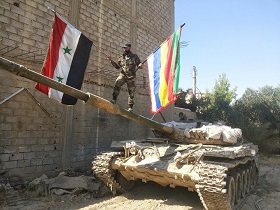
Sergey Balmasov:
The Druze State: Another Consequence of
the Middle East Crisis
The long-term goal of Jabhat al-Nusra is the establishment of an Islamic Caliphate by building an Islamic state in Syria, which is a step towards the liberation of Jerusalem [5].
Its strategy boils down to integrating into local communities and winning the hearts and minds of its members. As prescribed by the guidelines of al-Zawahiri issued in July 2014, the organization must build bridges with the Syrian population and insurgent groups. When Jeish al-Fatah captured Idlib, al-Jilani said that the group “was not going to rule the city or dominate the government.” Proceeding from the concept of Ansar ash-Sharia that proclaims the rejection of monopolized authority and a transition from sectarianism to cooperation with other organizations and structures, as well as the provision of public benefits, Jabhat al-Nusra managed to convert large segment of the grassroots population into Sharia.
Against the backdrop of ruthless ISIS rule, this approach has stricken a chord with Syrians who have rushed to Jabhat al-Nusra that has virtually become a Syrian-Levantine entity [6].
Al-Jilani applied a strategy leaning on its inventor Abu Musab al-Suri (Mustafa bin Abd al-Qadir Setmariam Nasar), who had been influenced by the Muslim Brotherhood leaders, among them Sayid Quthb, Abdullah Azzam and Marwan Hadid. The leader of Jabhat al-Nusra believed that Syria is unfit for the tough centralized rule professed by ISIS. This approach in fact matches the doctrinal specifics of al-Qaeda that prefers decentralized administration.
Adjusting to the new environment, Salafi jihadism is still committed to armed uprising.
Al-Suri focuses on three aspects: 1) the sanctity of Muslim blood even if a Muslim is sinful or has committed a crime (infidelity or kufr); 2) punishment after the establishment of Sharia, including hudud (irrelevant until implementation of point 3); 3) the expulsion of infidels and foes from Muslim lands [7].
How does Abu Musab al-Suri see expulsion? He relies on de-hierarchization rather than on traditional organized structures, as the mujahids should be united by common beliefs, doctrine and goals. His works, primarily The Global Islamic Resistance Call (Da'wat al-muqawamah al-islamiyyah al-'alamiyyah) insists that the jihad mission must be a collective project of the ummah [7] through the delegation of missions to lower levels. His method of individualized jihad prescribes the use of lone wolves operating independently, inspiring fear along with a sense of unpredictability, indefiniteness and inevitability of a terrorist attack. The next level or saraya (individual brigades, groups) implies a system of actions suggesting the organization of ideologically united, independent mobile groups unbound by oath and engaged in recruiting and exerting permanent pressure on the aggressors. They interact with similar groups and maintain close ties with local communities [7].

RIAC Debates
The long-term objective of Jabhat al-Nusra lies in the establishment of the Islamic Caliphate.
Jabhat al-Nusra is especially famous for its “moderate” treatment of minorities. According to al-Suri, the people of Qibla, i.e. those somehow related with the Islamic world, even if they deviate from the true faith as seen by jihadists, must be taught rather than exterminated [7]. Notably, the organization apologized to the Druzes for “unsubstantiated killing” and promised to “punish the guilty”. However, it was the case with southern Druzes, who are important and close to Israel. Actually, Lebanese Druze leader Walid Jumblatt called on the Syrian Druzes to refrain from supporting Bashar Assad. Druzes governed by Jabhat al-Nusra in northern Syria and the province of Idlib in the district of Jabal a-Sumak had to submit and renege on their faith. Al-Jilani said: "They did not fight against us… our stand means an appeal to the Druzes, we send them our preachers who explain to them their faith-related errors… and many of them shed the faulty convictions."
In May 2015, in an exclusive interview to Qatari TV channel al-Jazeera, al-Jilani said that his people were not targeting the Alawites. He insisted that in Syria al-Qaeda was attacking "only those who assault us and kill our men." Al-Qaeda was not going to use Syria for striking the West. Jabhat al-Nusra is warring only with the Assad regime and its “agents on the land”, including Hezbollah and the like.
Al-Jazeera presented Jabhat al-Nusra as a moderate group, although this is hardly true. There are differences in the English and Arabic versions of the video in episodes on Alawites. The English text interprets al-Jilani as follows: "We will not hurt or persecute them or the Druzes or anyone else." But in Arabic the statement was somewhat different: "not only must Alawites stop fighting for Assad, they must also abandon the elements of their faith that contradict Islam" (al-Jilani means Sunni Islam). In this case, Jabhat al-Nusra undertakes to defend them. In other words, Alawites may exist in peace under Jabhat al-Nusra only if they stop being Alawites.
The operations of Jabhat al-Nusra in Syria fully match the updated ideology of al-Qaeda and the evolving Salafi jihadist thinking in the Arab Spring context. The support of protest movements in their drive toward the Sharia, connivance to the inclusive political process inside the anti-Assad front, moderation and pragmatism against the ISIS atrocities, the proclaimed moderate (as compared with the ISIS) treatment of minorities – these are the basics of the strategy employed by Jabhat al-Nusra.
What’s Next?
Before Russian military involvement began, some experts still believed that the Syria crisis was a local or regional phenomenon. Now its international scale has become a reality, with future developments hinging on the support rendered by regional and other actors to their proxies, as well as on the domestic situation in these countries, i.e. the recent elections in Turkey and coming campaigns in Russia and the United States. What will these developments mean for Syria?
Although the Geneva-3 conference has still yet to be announced, the balance of forces will definitely change, bolstering President Assad. The main problem of the Syrian Arab Army is of course the shortage of personnel. With assistance from the Russian air force, detached Iranian contingents and Hezbollah, the government forces seem able to divert their opponents' offensive from Latakia and Damascus, and clean the Useful Syria territory of radical groups. In the near future we should expect fierce battles in the south (around Hama and Damascus), in the north (approaches to Idlib – cities of Jisr ash-Shugur and Eriha, Maareth en-Nuuman, as well as Aleppo), in the south (Daryia and adjacent settlements). Eastern Syria appears so far quiet, although this is the site of the key oil fields (Deir ez-Zor). Russian planes have delivered several strikes around Palmira (El-Karyatein). The army must also block the borders with Jordan and Turkey in close contact with northern Kurds who are preparing an offensive on the ISIS capital of Raqqa with the help of the Americans. These appear to be the directions for providing support to the moderate opposition by regional players, primarily Saudi Arabia, Qatar and Turkey, who are only bolstering the groups linked to Jabhat al-Nusra.
In contrast to ISIS, Jabhat al-Nusra is connected to the terrorist organization without territorial ambitions, which possesses a ramified network of supporters in many countries. Two weeks after the launch of Russian air raids, the leader of Jabhat al-Nusra called on all Muslims of the former USSR to attacks civilians in Russia if civilian Muslims got hurt. For Russia this means more pressure on its security services inside and beyond national borders.
Formerly, the organization was titled Jabhat al-Nusra li-Ahliash-Sham (The Front of Assistance to the People of Sham), while the current name is Jabhat al-Nusra Tanzim Kaidat al-Jihad fi Bilad al-Sham (The Front of Assistance – Organization of al-Qaeda Jihad in Sham (Levant).
1. Mohammad Abu Rumman / Hassan Abu Hanieh. The 'Islamic State' Organization: The Sunni Crisis and the Struggle of Global Jihadism. Amman: Friedrich Ebert Foundation, 2015. P. 115. among them, Sheikh Hamid al-Ali (Kuwaiti), Abu Qatada al-Filyastyni, Abu Muhammad al-Maksidi, Suleiman al-Alwan, Abu Munzir ash-Shanqiti, Abu Humam al-Asari and Abu Muhammad at-Tahawi.
2. Ibid. P. 128.
3. Ibid. P. 109.
4. Ibid. P. 111.
5. Ibid. P. 114.
6. Ibid. P. 123.
(no votes) |
(0 votes) |

